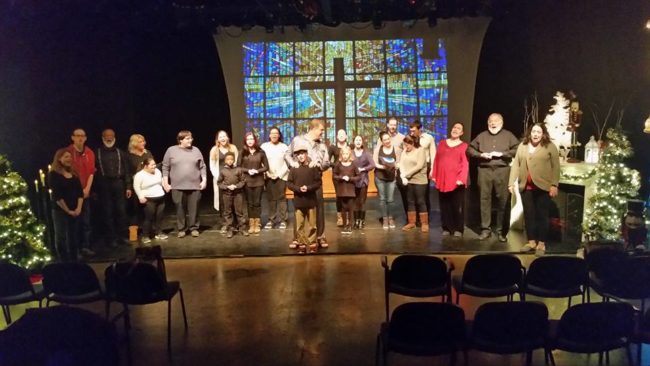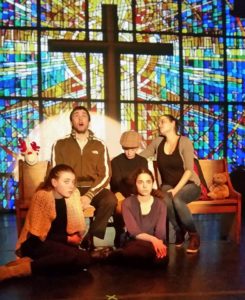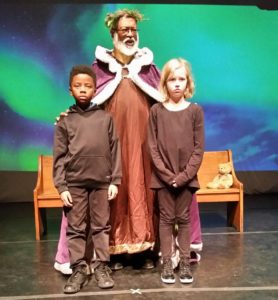Hark the herald angels sing— beckoning you to see this thing! Peace on earth and mercy mild, glory to this precious child! And all the children in Wolfpack Theatre Company’s production of A Christmas Carol. Written by Charles Dickens, Adapted and Directed by William Leary, this production is not the Dickensian classic you’re familiar with, unless you’ve been attending the Wolfpack family tradition over the last few years. When most companies choose to take the comedic twist, incorporating other iconic holiday figures, or taking Scrooge down a zany twisting path, Leary focuses on the heavier issues at hand, a hallmark of most of his original works. The Cratchit family has found themselves in a church homeless shelter because Tiny Tim’s medical expenses have cost them their house. Helping with the Warm Nights Shelter program, the family struggles to maintain their dignity during dark and difficult times while Scrooge receives a unique familial treatment when it comes to the three haunting spirits of Christmas. A remarkably touching and tragically beautiful adaptation of the seasonal favorite, Leary has found a way to draw attention to the bigger issues that plague a great many individuals at this festive time of year.

There are some inevitable pacing issues that pull the production’s overall progression into a slushy mire of lengthy talking scenes, but if you can get past the fact that several of these scenes mosey on rather than clip along, the production and its message are still quite enjoyable. What the production lacks in expediency it more than makes up for in vocal talent when it comes to the traditional hymns and carols that the performers sing. While including quite so many songs adds to the overall length of the show, it would be impossible to pick one to cut as they are all delivered with such beautiful voices, filled with the true spirit and meaning of Christmas.
Technical Director and Designer Stephen Beitzell ups the ante on this year’s technical spectacle, including fog effects (and if you’re very fortunate— fire alarm effects too!), wild new lighting, and perhaps the most special element of all: projections. Beitzell’s work with the projections adds a polished layer of finesse to the overall production, allowing for scenic shifts in both real time and recollected memory to be thoroughly enhanced. Using a swirling vortex of stars and night skies for when Scrooge travels with the ghosts (an occasional Aurora Borealis sneaks its way in there too), Beitzell creates the illusion of movement without Scrooge and the spirits ever having to move from their position center stage. The glorious stained glass window that represents the sanctuary in the church is another noteworthy projection used in the production by Beitzell, but the series of images most profound are the actual photos of homeless people on the streets and in shelters featured behind the congregation during a scene in the “Christmas future.” These harrowing pictures strike a chord of humanity in the audience and do their intended job.

While adaptor William Leary’s dialogue at times is very blatant, almost smacking the issues directly into your face, it is powerful in describing the experience of what it’s like to struggle through difficult times. The opening scene, with all of the homeless gathered around their lone alley trash can fire, is profound; it truly showcases the nature of good fortune and highlights the notion of “there but for the grace of God go we.” Leary refocuses Dickens’ tale to more thoroughly incorporate God and the church and makes Ebenezer’s plight about not only straying from the path of humanity but losing his faith as well. Drawing the focus further still into the real life, modern day situations of families struggling with illness and financial constraints and the lack of understanding and compassion in the world, Leary brings a powerful awareness to his audiences, and teaches a similar lesson to that which Dickens originally intended.
With a powerful ensemble that supports in the group carols, there are quite a few standout performances among these delightful performers including young Fela Osimokun, who delivers a sentimentally touching line about Santa not knowing which shelter he and his mother are at despite him having wrote a letter because they change shelters from week to week. Maria Stephanos and William Downs also deserve a nod, showing up as Tony and Maria (a nod to West Side Story), an abandoned couple who have been turned out of their home and treated like a burden on society. Their Angel (Terry Downs) rescues them and welcomes them to the Warm Nights program, run by Pastor Charlotte (Vashti Gray Sadjedy.)
Reprising the role of the pastor Sadjedy delivers a powerful representation of this beacon of faith and hope, especially when it comes to her scene with Tiny Tim (Wesley Schmidt.) They have a good solid chat, which is both heartfelt and earnest. Schmidt has a great many of these moments, both with the pastor and other members of the Cratchit Family— including his mother Rachel (Vanessa Berben) and sisters Joy (Samantha Roberts) and Hope (Emilee Schmidt.)— and especially with father Bob Cratchit (Jamie Brill.) Young Wesley has a serene voice, perfect for singing “In the Bleak Midwinter”, a touching solo given to the lad all by himself.

Brill, who has a robust singing sound (so lovely that he needn’t modify his vowels when singing) delivers a beautiful rendition of “The First Noel” and leads the ensemble for “Silent Night”, which is a harrowing juxtaposition against Tiny Tim’s funeral procession in the scene of Christmas that has yet to be. Berben, as Mrs. Cratchit, carries a sweet voice as well, dulcet and mellow for the moments when she sings. Bringing a convivial and well-paced liveliness to her spoken moments, especially the dialogue shared with Belle (Susan Smithers), Berben becomes one of the most impressive actors on the stage. Joining her Cratchit daughters, Roberts and Schmidt, after a powerfully moving scene that expresses the distress the young girls are experiencing, all three ladies deliver a lovely rendition of “All Through the Night”, though the girls mostly listen to Berben sing the first few verses.

Susan Smithers, who has lived to tell the tale of loving and losing Ebenezer Scrooge, delivers a powerful rendition of “It Came Upon a Midnight Clear” making her sorrow palpable in the song. Her younger counterpart, ‘Young Belle’ (Lauren Patton) is equally gifted of voice and demonstrates this when she sings “Amazing Grace.” This is a heartfelt confession of her broken heart as she makes the difficult decision to leave the money-loving miser in her past. Other spirited performances come from Holly (Caitlin Cavanagh) and Edward (EJ Reynolds) as well as Young Ebenezer (Chris Costello), all of whom have sparkling moments of brilliance peppered throughout the production.
The booming blast of vocality from Jacob Marley (Kevin Buter) is so powerfully frightening that it stirs up enough commotion to cause alarm. Just one of three brilliant spirits that pays a visit to Scrooge (Tim Jansen) over the course of the evening— as Buter is double cast as the Ghost of Christmas Future— this rendition of Marley (accompanied by scrolling flame projections and a wild flame-volcano fog-machine effect that is truly out of this world) makes his impact felt upon the pre-strike of midnight.
Tim Jansen, as Scrooge, is well-suited for the role. Starting a bit too heightened with his anger and humbuggery, as it gives him no place to grow to once he gets really flustered and infuriated, Jansen makes it clear that he hates Christmas. With a few minor instances where he eagerly jumps his line-delivery (sometimes even Scrooge gets excited about A Christmas Carol), Jansen finds a balance between the roaring grumpus that is Ebenezer and the changed man that his transformation makes him out to be. There are a great many moments shared with his father Andrew (David K. North) and his mother Martha (Lauren Giglio) that reflect him to be little more than a scared and confused child, which is a touching sentiment to bring to the character, who often runs the risk of being played one-dimensionally.

David K. North has a robust laugh that carries with infectious glee all through the cast. First experienced as Andrew, Scrooge’s father, he leads the members of the ensemble in a hearty rendition of “Jingle Bells”, complete with delicious harmonies that he provides. Equally as booming as Jacob Marley when North arrives on the scene as the Ghost of Christmas Present, he puts his performance talents to exceptional use, letting his spirits run the scene. Decked out in a rich purple robe, silver lined and white fur trimmed— befitting for a king of Christmas— North strolls onto the scene crowned in holly and pine wreathing with the same branches adorning his festive walking stick. But the moment where North truly shines is his striking rendition of “O, Holy Night.” This song may very well be the show-stopper number that touches each and every heart of the audience.

Lauren Giglio all but steals the show with her kind but firm words as the Ghost of Christmas Past. AS Scrooge’s Mother, who is then said spirit, Giglio brings an earnest congeniality to the role that does not go unnoticed by those watching her. Wearing an equally befitting robe, though hers is white with twinkling purple lights, silver lining and fur trim, Giglio moves with a fluidity that makes her appear to float through the scenes. Her voice is delicate, an angel’s song, beckoning from on high when she sings “The Bells of Christmas.” Her first few voices are quiet, fragile like fallen snow but when she rolls into the final verse it’s as if her voice has become its own amplified chorus of heavenly host, singing along as one using her sound to echo the sentiment of the season.
A touching production, if a bit heavy and sad, Wolfpack Theatre Company’s A Christmas Carol will remind you to count your blessings, inspire you to help those less fortunate, and share with you a fond Christmas memory that will not soon be forgotten.
Running Time: 2 hours and 20 minutes with one intermission
A Christmas Carol plays through December 18, 2016 with Wolfpack Theatre Company at Joe’s Movement Emporium— 3309 Bunker Hill Road in Mt. Rainer, MD. Tickets are available for purchase at the door and in advance online.


Correction: The reference to Elijah Sadjedy is actually Fela Osimokun.
All sorted! Thanks!
👌🏾😄